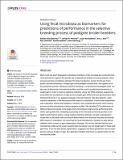Using fecal microbiota as biomarkers for predictions of performance in the selective breeding process of pedigree broiler breeders
Author(s)
Perrotta, Allison R.; Rockafellow, Isaac; Alm, Eric J.
DownloadPublished version (681.4Kb)
Publisher with Creative Commons License
Publisher with Creative Commons License
Creative Commons Attribution
Terms of use
Metadata
Show full item recordAbstract
Much work has been dedicated to identifying members of the microbial gut community that have potential to augment the growth rate of agricultural animals including chickens. Here, we assessed any correlations between the fecal microbiome, a proxy for the gut microbiome, and feed efficiency or weight gain at the pedigree chicken level, the highest tier of the production process. Because selective breeding is conducted at the pedigree level, our aim was to determine if microbiome profiles could be used to predict feed conversion or weight gain in order to improve selective breeding. Using 16s rRNA amplicon sequencing, we profiled the microbiomes of high and low weight gain (WG) birds and good and poor feed efficient (FE) birds in two pedigree lineages of broiler chickens. We also aimed to understand the dynamics of the microbiome with respect to maturation. A time series experiment was conducted, where fecal samples of chickens were collected at 6 points of the rearing process and the microbiome of these samples profiled. We identified OTUs differences at different taxonomic levels in the fecal community between high and low performing birds within each genetic line, indicating a specificity of the microbial community profiles correlated to performance factors. Using machine-learning methods, we built a classification model that could predict feed conversion performance from the fecal microbial community. With respect to maturation, we found that the fecal microbiome is dynamic in early life but stabilizes after 3 weeks of age independent of lineage. Our results indicate that the fecal microbiome profile can be used to predict feed conversion, but not weight gain in these pedigree lines. From the time series experiments, it appears that these predictions can be evaluated as early as 20 days of age. Our data also indicates that there is a genetic factor for the microbiome profile.
Date issued
2019-05-07Department
Massachusetts Institute of Technology. Department of Civil and Environmental Engineering; Massachusetts Institute of Technology. Department of Biological Engineering; Massachusetts Institute of Technology. Center for Microbiome Informatics and TherapeuticsJournal
PloS one
Publisher
Public Library of Science (PLoS)
Citation
Díaz-Sánchez, Sandra et al. "Using fecal microbiota as biomarkers for predictions of performance in the selective breeding process of pedigree broiler breeders." PloS one 14 (2019): e0216080 © 2019 The Author(s)
Version: Final published version
ISSN
1932-6203
Keywords
General Biochemistry, Genetics and Molecular Biology, General Agricultural and Biological Sciences, General Medicine